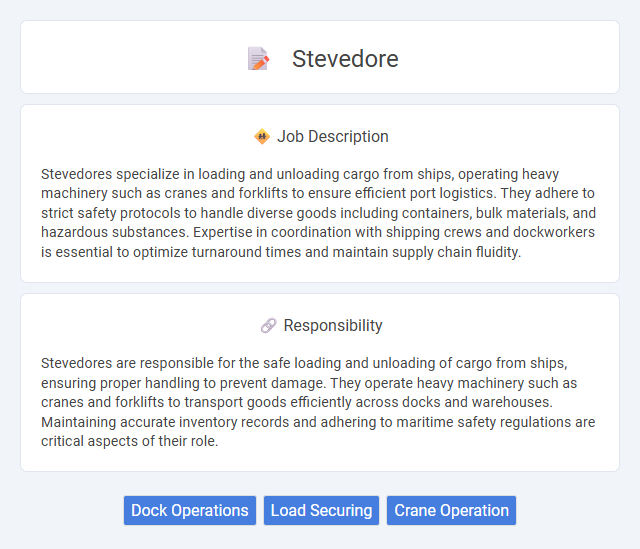
Stevedores specialize in loading and unloading cargo from ships, operating heavy machinery such as cranes and forklifts to ensure efficient port logistics. They adhere to strict safety protocols to handle diverse goods including containers, bulk materials, and hazardous substances. Expertise in coordination with shipping crews and dockworkers is essential to optimize turnaround times and maintain supply chain fluidity.
Stevedores often work in physically demanding environments that require strength, stamina, and the ability to handle heavy lifting and outdoor conditions. Individuals with good physical health and resilience are more likely to be suitable for this job, whereas those with mobility or health limitations may find it challenging. The role might also suit people who can adapt to irregular work hours and fast-paced workflows.
Qualification
Stevedores must possess physical strength, stamina, and the ability to operate heavy machinery such as cranes and forklifts safely. Essential qualifications include a high school diploma or equivalent, along with specialized training in cargo handling, safety protocols, and hazardous materials management. Certification in Occupational Safety and Health Administration (OSHA) standards and experience in maritime logistics significantly enhance employability.
Responsibility
Stevedores are responsible for the safe loading and unloading of cargo from ships, ensuring proper handling to prevent damage. They operate heavy machinery such as cranes and forklifts to transport goods efficiently across docks and warehouses. Maintaining accurate inventory records and adhering to maritime safety regulations are critical aspects of their role.
Benefit
Working as a stevedore likely offers the benefit of hands-on work with opportunities for physical activity and skill development in cargo handling. The job may provide good earning potential through overtime and shift differentials, especially in busy ports. Access to strong union representation could also enhance job security and benefits such as healthcare and retirement plans.
Challenge
Stevedore jobs may present significant challenges involving heavy physical labor and strict time constraints while loading and unloading cargo. Workers might face unpredictable weather conditions and safety risks, requiring constant vigilance and adherence to protocols. Adapting to complex logistics and shifting schedules is likely essential for success in this demanding role.
Career Advancement
Stevedores play a critical role in loading and unloading cargo at ports, gaining hands-on experience with heavy machinery and logistics coordination. Career advancement opportunities include progressing to supervisory roles such as dock foreman, operations manager, or logistics coordinator, often supported by certifications in safety and equipment handling. Developing specialized skills in container management and port operations technology can significantly enhance a stevedore's potential for higher wages and leadership positions.
Key Terms
Dock Operations
Stevedores play a crucial role in dock operations by efficiently loading and unloading cargo from ships, ensuring timely turnaround of vessels in busy ports. Their expertise in handling various types of freight, including containers, bulk, and breakbulk cargo, optimizes shipping schedules and maintains supply chain continuity. Advanced knowledge of safety protocols and equipment operation, such as cranes and forklifts, enhances operational efficiency and minimizes dockside accidents.
Load Securing
Stevedores specializing in load securing ensure cargo is safely fastened to prevent shifting during transport, reducing the risk of damage and accidents. They use equipment like straps, chains, and locking devices, adhering to industry standards such as the Cargo Securing Manual and international maritime regulations. Expertise in weight distribution and tensioning techniques is critical to maintaining vessel stability and compliance during loading and unloading operations.
Crane Operation
Stevedores specializing in crane operation expertly handle heavy cargo loading and unloading ships, utilizing gantry cranes, container cranes, and mobile cranes to ensure efficient port logistics. Their proficiency in controlling crane movements directly impacts vessel turnaround times and overall terminal productivity, while adhering to stringent safety protocols reduces the risk of accidents and cargo damage. Mastery in operating modern crane control systems and coordination with dockworkers is essential for seamless maritime freight management.
 kuljobs.com
kuljobs.com